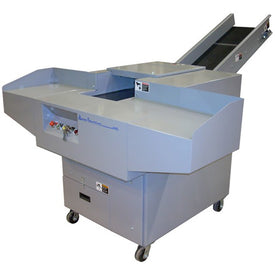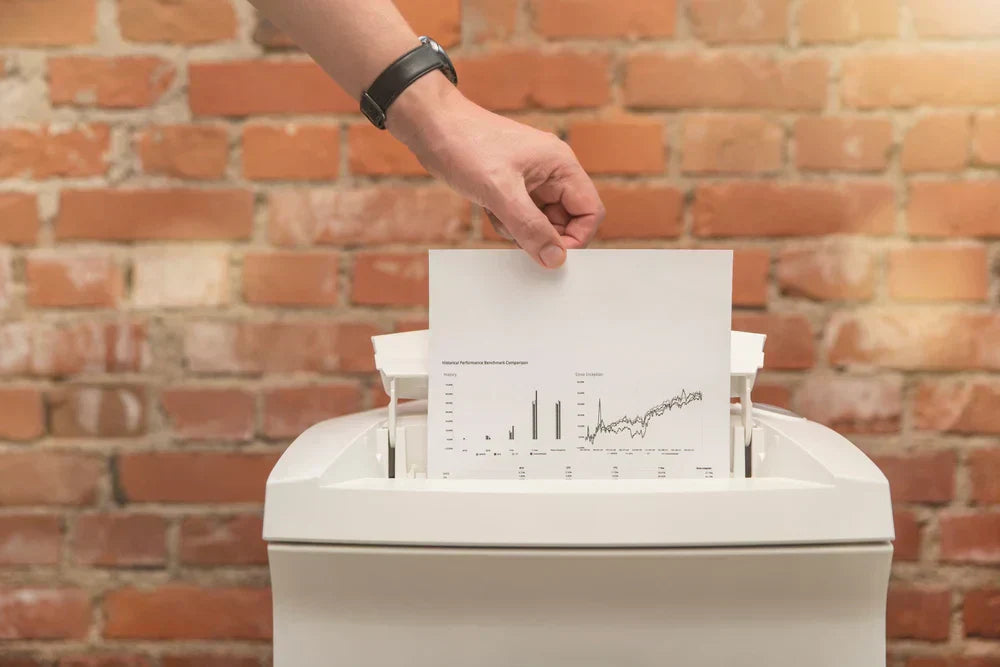Choosing the medical shredder for your business
When it comes to medical destruction, one of the industry leaders is Ameri-Shred. This industrial shredder manufacturer creates an extensive assortment of medical waste shredders to suit your organization, helping you to keep patient records and sensitive information secure. As the world leader in medical destruction equipment, Ameri-Shred designs shredders for high-volume and centralized shredding, enabling organizations to keep their data destruction solutions in-house for greater on-site security.
Their selection of cross-cut medical shredders effectively destroy patient records, ensuring HIPAA compliance, and have been designed with high volumes in mind. The conveyor-fed industrial paper shredder is capable of handling some of the most challenging materials, with three different shred sizes to ensure the highest level of security. Many medical document shredders come with auto-lubrication, to ensure that the blades and the machine continue to run in optimal condition.
There are a number of other medical shredders for you to choose from, such as pill bottle pharmacy shredders. Perfect for the medical supply and healthcare industry, these shredders can be used to destroy a range of medical materials including pill bottles and other medical supplies. With a ten-second cycle time to shred pill bottles and other materials, you can destroy medical equipment effectively and quickly. Shred syringes and blister packs with ease. This equipment is HIPAA compliant, and provides you with the highest level of security for your business needs.
HIPAA-compliant medical destruction
Established in 1945, Whitaker Brothers has over 75 years of industry expertise. We know how important it is to adhere to regulations and requirements, especially with data security, which is why we offer such an extensive range of data destruction equipment. From medical shredders to pill bottle destruction, we stock everything an organization needs to remain compliant with HIPAA regulations.
Unsure about the equipment you need? Contact Whitaker Brothers today or call us at (800) 243-9226. Our dedicated team of professionals can help you find the perfect solution for your business, whether you are a commercial or government organization. Just tell us about the type of documentation or equipment you need to destroy, and we will help you understand how to meet and exceed the lawful minimum requirements.
Keeping your medical destruction equipment in top working condition is essential, especially with HIPAA and PII information to destroy. This is where our Service Center comes in. Here you can get all of the additional support you need. Find spare parts for your equipment, book a repair technician visit, or discuss a service contract to be on top of equipment maintenance and servicing. Since we have the most tenured and well-trained staff in the U.S., we have the knowledge to back up our products, so arrange for professional repairs and warranty support today.
Find Out What Our Customers Think
Choosing the medical shredder for your business
When it comes to medical destruction, one of the industry leaders is Ameri-Shred. This industrial shredder manufacturer creates an extensive assortment of medical waste shredders to suit your organization, helping you to keep patient records and sensitive information secure. As the world leader in medical destruction equipment, Ameri-Shred designs shredders for high-volume and centralized shredding, enabling organizations to keep their data destruction solutions in-house for greater on-site security.
Their selection of cross-cut medical shredders effectively destroy patient records, ensuring HIPAA compliance, and have been designed with high volumes in mind. The conveyor-fed industrial paper shredder is capable of handling some of the most challenging materials, with three different shred sizes to ensure the highest level of security. Many medical document shredders come with auto-lubrication, to ensure that the blades and the machine continue to run in optimal condition.
There are a number of other medical shredders for you to choose from, such as pill bottle pharmacy shredders. Perfect for the medical supply and healthcare industry, these shredders can be used to destroy a range of medical materials including pill bottles and other medical supplies. With a ten-second cycle time to shred pill bottles and other materials, you can destroy medical equipment effectively and quickly. Shred syringes and blister packs with ease. This equipment is HIPAA compliant, and provides you with the highest level of security for your business needs.
HIPAA-compliant medical destruction
Established in 1945, Whitaker Brothers has over 75 years of industry expertise. We know how important it is to adhere to regulations and requirements, especially with data security, which is why we offer such an extensive range of data destruction equipment. From medical shredders to pill bottle destruction, we stock everything an organization needs to remain compliant with HIPAA regulations.
Unsure about the equipment you need? Contact Whitaker Brothers today or call us at (800) 243-9226. Our dedicated team of professionals can help you find the perfect solution for your business, whether you are a commercial or government organization. Just tell us about the type of documentation or equipment you need to destroy, and we will help you understand how to meet and exceed the lawful minimum requirements.
Keeping your medical destruction equipment in top working condition is essential, especially with HIPAA and PII information to destroy. This is where our Service Center comes in. Here you can get all of the additional support you need. Find spare parts for your equipment, book a repair technician visit, or discuss a service contract to be on top of equipment maintenance and servicing. Since we have the most tenured and well-trained staff in the U.S., we have the knowledge to back up our products, so arrange for professional repairs and warranty support today.
Frequently Asked Questions
HIPAA makes the guidelines for medical records very clear. Medical records must be kept for either six years from their initial creation, or six years from their last use. Even when the state has separate data retention laws, the HIPAA regulation holds precedence.
Medical materials must be destroyed for a number of reasons such as safeguarding patient confidentiality, ensuring healthcare compliance, preventing identity theft, and preventing security breaches.
- Patient names
- Dates (birth dates and any other relevant dates)
- Social Security numbers
- Phone and fax numbers
- Email addresses
- Geographic identifiers
- Account numbers
- Medical record numbers
- Health plan beneficiary numbers
- Full face photos and relevant images
- Certificate and license numbers
- Biometric identifiers such as retinal scans or fingerprints
- Device identifiers and serial numbers
- Vehicle identifiers and serial numbers
- Web URLs
- IP addresses
- Other unique identifiers, characteristics, and codes









